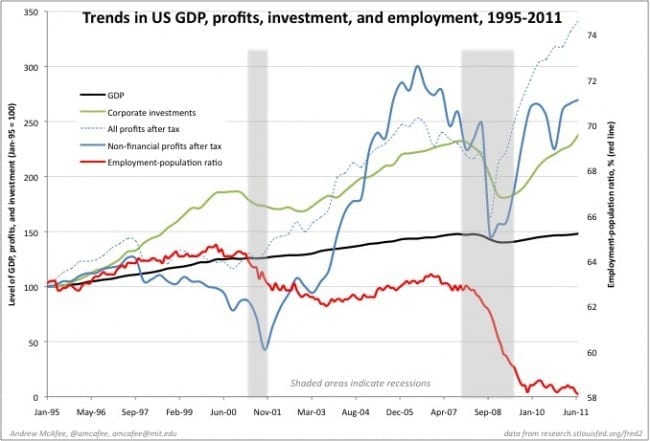
“The key to winning the race is not to compete against machines but to compete with machines.”
It has become a campaign ritual. Immediately after the release of unemployment figures on the first Friday of every month, Democratic and Republican spin shifts into high gear.
“Our mission is not just to get back to where we were before the crisis. We’ve got to deal with what’s been happening over the last decade, the last 15 years — manufacturing leaving our shores, incomes flat-lining — all those things are what we’ve got to struggle and fight for,” Obama declared at the Dobbins School in Poland, Ohio.
Romney took the opposite tack in Wolfeboro, N.H.: “This is a time for America to choose whether they want more of the same; whether unemployment above 8 percent month after month after month is satisfactory or not. It doesn’t have to be this way. America can do better and this kick in the gut has got to end.”
Both candidates are only tinkering at the edges of the most important issue facing the United States: the hollowing out of the employment marketplace, the disappearance of mid-level jobs.
The issue of the disappearing middle is not new, but credible economists have added a more threatening twist to the argument: the possibility that a well-functioning, efficient modern market economy, driven by exponential growth in the rate of technological innovation, can simultaneously produce economic growth and eliminate millions of middle-class jobs.
Michael Spence, a professor at N.Y.U.’s Stern School of Business, and David Autor, an economist at M.I.T., have argued that this “hollowing out” process is a result of twin upheavals: globalization and the hyper-acceleration of technological progress.
Just two weeks ago at the Aspen Ideas Festival, Alan Krueger, Chairman of the Council of Economic Advisers, stressed this theme:
If you look at the decade before the recession, the U.S. economy was not creating enough jobs, particularly not enough middle class jobs, and we were losing manufacturing jobs at an alarming rate even before the recession. And I would also put together, combined with those two problems, the polarization of the U.S. job market, the fact that we are getting more and more people at the very top and the very bottom and the middle has been shrinking.
In recent months, Erik Brynjolfsson, a professor at the M.I.T. Sloan School of Management, and Andrew McAfee, a research scientist at M.I.T.’s Center for Digital Business, have raised the stakes in this discussion with the publication of “Race Against the Machine” and a collection of accompanying essays and papers by the authors.
via New York Times – Thomas B. Edsall
The Latest Streaming News: Technology and Jobs updated minute-by-minute







